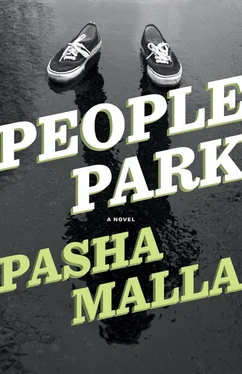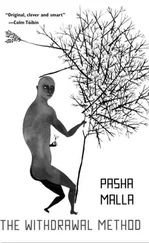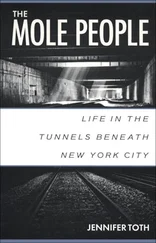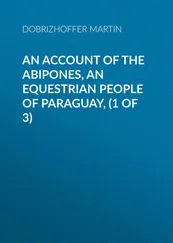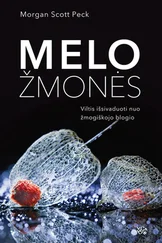Debbie sprung from the ledge. Adine?
It was only the apartment, its rickety walls spoke their own dialect of ticking and groans. Adine ? echoed through the empty rooms. Debbie did this often, called her name, sometimes for no reason — it just came out, midsentence while reading or doing the dishes: Adine? And when Adine came harrumphing into the room, hands on hips, and Debbie would have to invent some excuse as to why she needed her. What was this instinct, akin to some nightmare-stricken child pawing for a parent in the dark: Adine, Adine, Adine?
But now she didn’t come. The letter lay unfinished and abandoned somewhere between thoughts. Fog choked E Street. Adine was out there somewhere in it, thinking spitefully of Debbie. But where? To whom might she flee? At Sam’s maybe — but the phone was dead, there was no way to call. The island suddenly seemed too huge, its streets sprawling in vast and terrifying catacombs within the mist.
Debbie tore out a page from her notebook, wrote a quick purposeful note: Not sure where you are. Worried. Heading out to find you. Sorry about last night. See you back here if you come home first. Love, Deb. This she taped to the TV, collected her jacket and keys, and with a glance over the apartment, taking everything in, realized that Adine might not be able to read it. But she’d left. She’d gone somewhere. She couldn’t have done it blind. So the note was a gesture of faith, thought Debbie, as she headed out into the city, making sure to leave the door unlocked.

CALUM HAS NO idea how long he’s been walking. The scene keeps repeating: the bridge is identical with the same beams and girders and lampposts and the smooth roadway split with the yellow dividing line, the horizon never gets any closer, there is no way to gauge how much distance he’s travelled and no change in light to suggest the progression of hours. Also each step feels part of a steady fluid motion that his body performs outside of itself, churning along the bridge so along the bridge his body walks, toward — toward what, toward nothing.
He remembers hearing a voice, the voice hasn’t returned. From which direction did it come and should he be seeking or escaping it, Calum doesn’t know, he doesn’t know which he is doing anyway. The silence out here is cottony, a river would make some watery whispering noise but whatever’s below doesn’t, it just hovers blackly beneath the mist and everything’s dampened and the only noise sometimes is the bird: and here is the bird, the fup-fup of its wings as it flies by and disappears, where does it go, Calum wonders. All he sees is the sky, and the bridge, so he walks.
The air smells of water. Nothing is getting closer: there is no nearing shore, just the endless bridge which slopes gently to an apex beyond which it seems to slope down, though Calum is perennially on the upslope, the apex always just beyond reach, he feels himself chasing a wave as it rolls steadily away.
It feels, Calum thinks, like being on some enormous treadmill. The girders and beams and lampposts he passes indicate momentum, yet they are the same, the same, the same. He seems to be a character, he thinks, in a piece of cheap amateur cinema with the scenery cranked around and around on an endlessly repeating scroll.
And if this is a film then Calum’s body is just an illusion, he thinks, a mirage fidgeting in and out of existence, and if the projector breaks or stops Calum will shudder for a moment and then fade and cease to even be. Like something dreamed and destroyed upon waking. And so to exist he must keep moving, toward the bridge’s peak, toward nothing, just on along the bridge and forever and ever on.

THE TRAY PUNCHED through the slot, a jeering tongue. Sam approached cautiously. Upon it was an applecore nibbled into an hourglass and already browning. He peered through the peephole. The armoire was empty.
You ate the apple Raven, said Sam, so I know you’re in there Raven.
He shifted his ear to the peephole, listened.
Outside a sprinkler spat arcs of water over the roominghouse lawn.
I can’t even let you out if I wanted to okay. I don’t even have the combination of this lock. There’s a way I guess of getting it open, a boy showed me how from your book. But I don’t know how. I don’t remember. I never knew.
Sam removed the applecore, pushed the tray in square with the door. From underground there was no sign of time’s machine starting up again. The floor didn’t judder or vibrate, the silence down there felt booming and hollow. And his third watch was still stopped. Now the end would be like a train barrelling headlong to a precipice, the tracks running out, and the whole thing hurtling over the edge.
You have to help us, said Sam. You have to okay. I’ve done all the work and —
From inside the armoire came the sound of a book opened in a windstorm, pages flapping madly. Sam peeked in. Something ragged and panicked fretted through the dim light: a bird. It bumped against the ceiling, flung itself against the door, settled. A few feathers puffed through the crack, drifted to the carpet.
I can’t let you out okay, said Sam, even if I wanted to.
The armoire shuddered with another collision, the bird squawked, hit the door again, beak and claws ticking.
Please stop.
It seemed to listen. Stillness prevailed. From beyond the basement the sprinkler sputtered and hissed.
Sam stepped hesitantly toward the armoire.
The tray slid out of the door. Upon it was the bird — a dove — lying on its side, motionless and serene, eyes glazed, freshly dead, and served up as a dish.

ON CINECITY’s bigscreen appeared another title card. It explained that before that afternoon’s premiere of All in Together Now the theatre would screen a Best of We-TV countdown. This began with Lakeside Drives , an utterly unwatched show that consisted of a single tracking shot of the eponymous thoroughfare’s centreline, inch by inch of yellow paint striping black bitumen, from one end of the island to the other, and back — meant, Adine guessed, to be experimental, but without explanation only boring and bad. Everyone booed.
Next: the island’s community theatre troupe. Strange and solemn music played while shadowy figures in black undulated around a royal banquet, and just as the King opened his mouth to speak he was replaced with grainy film of a Y’s Classic , all that maroon and white thronging in the stands as time wound down toward a championship, and that became two matronly looking women poaching themselves in a hot tub and reciting highlights from their daughters’ diaries, and that in turn transformed into something else, and then something else, and so on.
It was weird to be watching TV again, thought Adine. And while this was exactly how she’d always navigated channels at home — relentless flipping — experiencing it at Cinecity, on this scale, in a roomful of strangers, was much more disorienting. With the images so enormous and the sound stereophonic and everywhere, her senses were overcome. She felt trapped on some endless babbling stream, forced to leap from stone to stone before each one flooded: establishing a foothold then plunging ahead to the next, just hopping along without a purpose or destination.
But more than that, the swift flicking through all those lives seemed deeply sinister. Each fleeting glimpse of existence suggested not only mortality but the expendability of people too. This was made even more tragic when shouts of recognition rang out in the theatre (Hey it’s me! — Hey it’s you! — I know that person, hey!). People delighted in seeing themselves or someone they knew up there, gigantic and famous, each a bit more popular than the last. But celebrations were brief before each station was supplanted with something better.
Читать дальше
